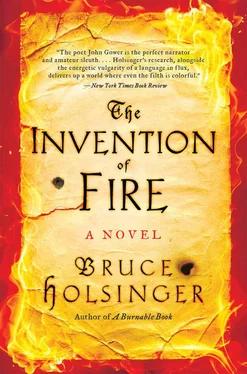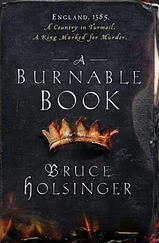Bruce Holsinger - The Invention of Fire
Здесь есть возможность читать онлайн «Bruce Holsinger - The Invention of Fire» — ознакомительный отрывок электронной книги совершенно бесплатно, а после прочтения отрывка купить полную версию. В некоторых случаях можно слушать аудио, скачать через торрент в формате fb2 и присутствует краткое содержание. Год выпуска: 2015, Издательство: HarperCollins, Жанр: Исторический детектив, на английском языке. Описание произведения, (предисловие) а так же отзывы посетителей доступны на портале библиотеки ЛибКат.
- Название:The Invention of Fire
- Автор:
- Издательство:HarperCollins
- Жанр:
- Год:2015
- ISBN:нет данных
- Рейтинг книги:3 / 5. Голосов: 1
-
Избранное:Добавить в избранное
- Отзывы:
-
Ваша оценка:
- 60
- 1
- 2
- 3
- 4
- 5
The Invention of Fire: краткое содержание, описание и аннотация
Предлагаем к чтению аннотацию, описание, краткое содержание или предисловие (зависит от того, что написал сам автор книги «The Invention of Fire»). Если вы не нашли необходимую информацию о книге — напишите в комментариях, мы постараемся отыскать её.
The Invention of Fire — читать онлайн ознакомительный отрывок
Ниже представлен текст книги, разбитый по страницам. Система сохранения места последней прочитанной страницы, позволяет с удобством читать онлайн бесплатно книгу «The Invention of Fire», без необходимости каждый раз заново искать на чём Вы остановились. Поставьте закладку, и сможете в любой момент перейти на страницу, на которой закончили чтение.
Интервал:
Закладка:
On the shallow far bank he slid from the wide back of his horse and staggered toward the water. She dismounted and tied their reins together. He had collapsed at the creek’s edge.
It was a grievous wound, she saw, a gash on his upper right thigh that sent spirals of blood through the water, dark coils in the rising light. With his knife she cut away the surrounding portions of his breeches and saw the extent of it. The opening was deep and wide, beyond her powers to heal. She wished for a surgeon but settled for a poultice, crafted from chickweed leaves, which she mashed up with mud from the bank. She smeared it into his wound, making him groan in agony.
He clutched at his leg. She pushed his hands away and had to sit on them to keep him from worsening the wound. She held him behind his neck with one hand, cooled his face with the other. His eyes fluttered open. More blood, leaking out around the poultice. His grip weakened. He fixed her with a stare, gave her a slight smile, raised his hand, then lowered it. At last he was still. She looked up at the sky, at circles of birds whorling in the chill morning air.
Chapter 43
From the wharf bankside of the Temple Church a narrow stone stair climbed up through the wide yard toward the level of the Strand, the broad road leading from the walls out past Charing Cross nearly to Westminster. Along the south side of this avenue marched a colorful series of great palaces and houses, all facing the Thames and showing the arms of their inhabitants: bishops, lords, some wealthier knights, a few successful tradesmen. Over the years many smaller structures had been built up against the back walls of these houses. Let to hostelers and shopkeepers and facing the smaller residences across the Strand, these randomly spaced buildings and fronts lent the avenue its flavor as simultaneously a busy commercial district and a fashionable place of residence for the monied. In the middle of it all sat the charred ruins of Lancaster’s Savoy, still uncleared since the Rising five years earlier. The land around it had been partially reclaimed since then, though the palace itself remained an unsightly hulk on the waterfront, overgrown with weeds, shrubs, and even young trees.
At nine on the morning of Exton’s Riding I had summoned the mayor’s guards and made for the Thames with Jack Norris at my side. We floated over the river to the Temple wharf, this time aboard a small craft let and rowed by one of the mayor’s guards. I had explained the plan to Jack as we crossed. He was bedazzled at the prospect of an audience with the king, an unthinkable thing for an earless cutpurse and the son of a hanged thief. Though I told him honestly of the risk in witnessing against a duke, he seemed determined to reveal what he had seen, whatever the consequences. He would remain with me for the balance of the morning, with both of us to be allowed into Westminster Hall on the word of Nicholas Brembre.
Our first destination was Lintner, the Earl of Suffolk’s large house less than a quarter mile up the Strand from Lancaster’s ruined palace. I decided to avoid the house’s wharf and enter discreetly from the street side, as the servants did, and pay a guard or attendant to announce my visit to the earl himself. We neared the house’s street wall, currently the site of a traveler’s inn alongside a furrier’s shop. I asked one of the guards to wait there with Jack for my return from within. With the other guard behind me I entered the narrow passage between the inn and the furrier’s shop, and soon was at the rear postern. Two men wearing the livery of the Tower stood guard. They leaned on pikes and were otherwise armed with long knives and longer swords. One of them recognized the mayor’s man.
“Well now,” he said to the other. “A Guildhall boy. What say you for yourself, Tilden?”
My guard said nothing, keeping his chin up and his eyes averted.
The Tower man lifted his pike, tapped it on the stones at his feet. “What say you for yourself, Tilden?” He took a step toward us. Tilden’s hand went to his short sword.
“None of this, my good men,” I said, stepping between them. “There is enough hatred between the Tower and the Guildhall to feed everyone without your help.” I looked at the Tower guard, held up a quarter noble. “I seek an audience with the chancellor.”
“The chancellor?” he scoffed. “There’s no chancellor within these walls that I know of. Merely an earl.”
“The earl, then,” I said.
“Ah, the earl.”
“Aye the earl, you sodden jake,” muttered my guard. The second Tower man now stepped up.
The postern door swung open. “Enough!” The speaker was John Staines, the steward of Lintner, a level-headed man. He regarded me closely. “Gower,” he said.
“Staines. I’d like to speak with him, if it’s possible.” I nodded toward the house. “And soon.”
The Tower man still had not taken my coin. Staines did. “Come along,” he said, stepping aside and letting us into the earl’s garden. “You are his lordship’s only caller today.” The door closed behind us, and I asked the city guard to remain there until I returned.
Staines, surprising me, put a hand on my arm as we stood within the gate. “I am glad you are here, Gower. His lordship finds himself suddenly unwelcome within his customary circles. He feels himself disgraced.”
“Only in his own eyes,” I said to the steward. “His reputation will surely outweigh these immediate troubles.”
“Surely.” He sounded skeptical.
“Is Edmund Rune about?” I asked, testing him.
Staines shook his head. “He left some time ago. He is the only one those Tower men will let in or out of Lintner, and now he is about on business for his lordship. We would like to get the earl out of London, today if we can. Rune is hoping the Riding will provide some distraction. He is making arrangements now.”
In his distress Staines had said too much, and his mouth clapped shut. I felt a rush of unease, a sour taste in my throat. The steward led me through the garden and into the grand house, a series of wide and elegant rooms that had been furnished and decorated over many years of the earl’s service to the crown. Lavish tapestries hanging from every third wall, others painted in scenes of civic and religious splendor, with particolored molding framing the doorways, and carved figures entwined among the foliated lintels. The chapel, which we passed on our way to the hall, shone like a box of jewels, chill air breathing from the depths, a haze of mingled hues glowing out from the windows on the east end.
Michael de la Pole, Earl of Suffolk, sat on an oaken chair above a balustrade off the house’s summer hall. When Staines announced me he remained still in his seat, giving the slightest nod to acknowledge my arrival.
“My lord,” I said softly to his back. He moved just slightly, sniffed. “I am truly sorry for your plight, my lord.”
“Yes.” He spoke without emotion. “Exiled from Westminster, mere weeks after my very voice opened Parliament. Now I am prisoner in my own home, nor will I be permitted to ride along for Exton’s procession this morning. Rune has enjoined me not to attend, nor to dignify the opposing lords with my presence, though I suspect Gloucester and his men have prohibited it in any case. A hanging will be next.”
“Not so, your lordship,” I said, reassuring him even as my alarm increased. “Men will see reason in time, and after all the king is your staunch ally.”
“What a warm comfort, that thought.” He shifted his body so that his side was to me, and I could see his smirking lips. The earl’s face, haggard and sagging, had greyed in the weeks since I saw him last. “Old King Edward, now there was an ally. Reigned for fifty years, and never once did his support for his counselor waver. His grandson has proven more . . . variable, shall we say. I try to advise him wisely, help him act in the realm’s best interests over his own. Yet my words run like melted wax out of his royal ear.”
Читать дальшеИнтервал:
Закладка:
Похожие книги на «The Invention of Fire»
Представляем Вашему вниманию похожие книги на «The Invention of Fire» списком для выбора. Мы отобрали схожую по названию и смыслу литературу в надежде предоставить читателям больше вариантов отыскать новые, интересные, ещё непрочитанные произведения.
Обсуждение, отзывы о книге «The Invention of Fire» и просто собственные мнения читателей. Оставьте ваши комментарии, напишите, что Вы думаете о произведении, его смысле или главных героях. Укажите что конкретно понравилось, а что нет, и почему Вы так считаете.












